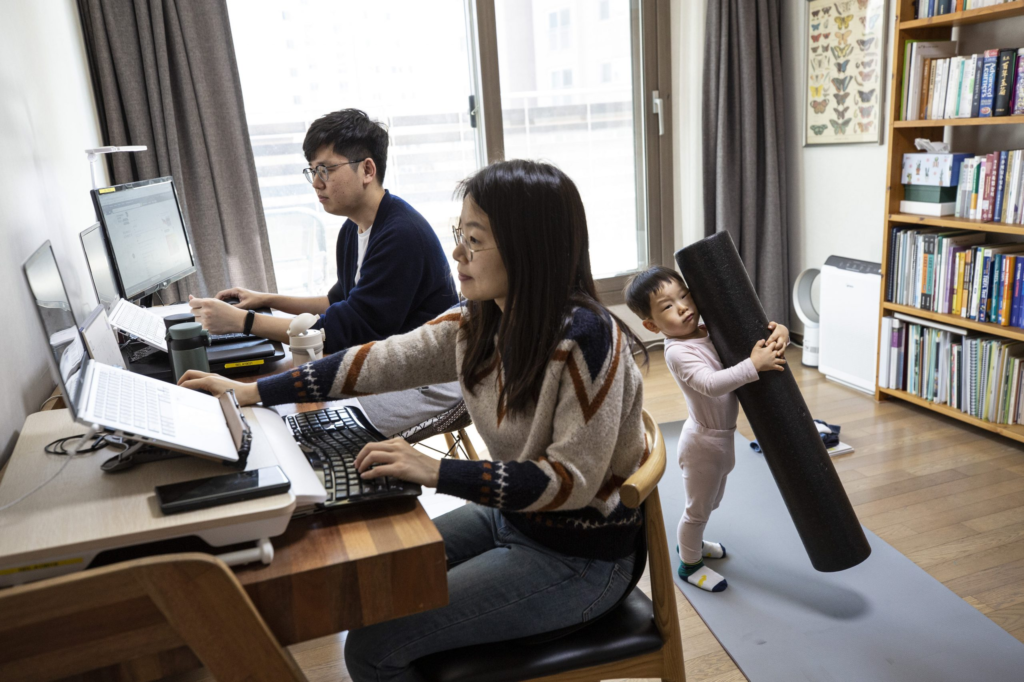The pandemic affected how people work, if there was any good to come of it. Employees were abruptly required to work remotely when Covid first appeared in an effort to stop the coronavirus from spreading. It has steadily emphasized the value of a work-life balance, which the younger generation can now look forward to.
Despite the relaxation of Covid-19 rules, more and more workers are adopting flexible work and appreciating the independence that allows them to maintain a healthy work-life balance. They don’t want to return to the office full-time; rather, they want more of it.

The government revised the Labour Protection Act, which was published in the Royal Gazette on March 19 and went into force on April 18, to encourage this expanding work trend. The changes, according to the statement, are intended to improve employees’ quality of life while aiding employers’ business operations.
The recently added article 23/1 authorizes an agreement between an employer and employees on using an internet-based system to work from home or from wherever the employees wish.
The law also includes specifics about working arrangements, such as the length of time an employer may permit employees to work remotely, overtime and rest policies, leave policies, job descriptions of employees, requirements for providing employees with work-related equipment to support them, and the costs of remote work.
If there hasn’t been a prior agreement on overtime with the employer, it states that employees have the right to reject any contact from that party after the working hours specified in the agreement.
The law is also very explicit that all employees, whether they work on-site or remotely, have the same legal rights.
Thai PBS World surveyed workers in a variety of professions to learn how they feel about working remotely, what makes them happy about it, what its drawbacks are, and whether they truly believe the model is being completely implemented as the amended law permits.
Work-life balance is improved and expenditures are reduced when done from home.

Working remotely offers flexibility in choosing an environment and time management that facilitates a healthy work-life balance and better productivity, according to Chombua A., a 48-year-old secretary to a hotel manager.
“I really like the independence and flexibility that remote work provides. Because I work from home, I can choose my own hours. In order to complete more work and spend more time with my family, I don’t spend hours commuting. I can cook dinner for my kid, for instance, while waiting for an online conference in the afternoon, said the mother who works at a prestigious hotel in the area.
However, this increased freedom and adaptability come with a price: rising utility costs for the home,
Working remotely has increased our electrical costs, Chombua said, adding that it also restricts our access to office supplies.
“I occasionally need to make copies of confidential company documents using a photocopier. She said, “I have to do it at the office.
30-year-old Mallika A., a sales executive for a Thai-Japanese joint venture company with a focus on manufacturing and technology, claimed that working from home saved her money on gas and car maintenance.
“I love being able to work from home. I learned that I can complete my work competently. After seeing a client, I don’t have to go back to the office to conclude my report. I do it at home and online email it to my supervisor. Driving necessitates refueling, and gas prices have soared. Additionally, the less I drive, the less damage my car sustains, and consequently, the less frequently I have to pay for maintenance. On my car, I spend a lot less money. That’s fantastic,” she remarked.
Work from home allows Saipan C., a 43-year-old federal servant, to save time, money, and promote her health.
“I really am autonomous. In my pajamas, I can complete my tasks. I don’t need business attire, the most of which cost a lot to dry clean. I don’t have to go outside, which lowers my danger of contracting the coronavirus and fine dust, both of which are harmful to our health. I can reduce the cost of my commute and the amount of time I spend driving to and from work, she said.Effective teamwork and communication are hampered by working remotely.
However, not everyone desires remote employment.
In order to do her work more successfully, Phanwipa S., a 42-year-old administrative assistant who works for a land survey and engineering consultancy firm, likes to work in an office setting.
“I require my supervisor’s approval for the requests and critical papers, including the survey results. I can do that because of my office job,” she stated.
Working remotely, she observed, can occasionally cause communication problems that result in miscommunication, mistrust, and resentment among team members.
I occasionally don’t receive enough responses from my team. Some team members overlook vital information or even fail to notice when I try to contact them. When they take too long to respond, especially when I need a speedy solution to a problem or a choice made, I get frustrated. That slows down our development. When we are face-to-face, I may ask them for a speedy response, according to Phanwipa, who is in charge of joint work.
Panchaphol Sthanphol, a 25-year-old public relations consultant, said he loves working in an office setting because he can collaborate with others and values his coworkers’ engagement and quick reactions. It might also give you more energy. He did note that there are advantages to working from home, like avoiding traffic and saving money on transportation and other expenses. He could also instantly resume his personal life after work was done.
Does working remotely function?

We posed the following question to the respondents: What would you do if your employer established a remote work policy and completely fitted this work model to the operations?
Mallika and Saipan firmly support the notion, arguing that in order for remote workers to complete jobs effectively, businesses must also give them access to the tools and office supplies they need.
“I’m currently completing the dining room table at home. It would be ideal if my company gave me a cozy workstation and chair for the office, Saipan stated.
Employees should have a choice as to where they work, according to Chombua, as long as they can do their duties competently and independently, and as long as employers are accommodating.
“Anyone can design a work schedule that suits them best. For myself, I’d like a hybrid job that lets me work remotely at least a couple days a week. That will help me balance my job and personal lives. On other days, though, I would go to the workplace where I could collaborate with my coworkers and work closely with my supervisor. Collaboration thus continues, she said.
Even if working remotely is becoming more and more common among employees, Phanwipa claimed that face-to-face communication is important since it fosters rapport and trust.
Working in person is preferable for me. We can develop a relationship and trust with someone when we are with them. And that encourages us to feel comfortable exchanging ideas and information, which helps our team function well,” she said.




